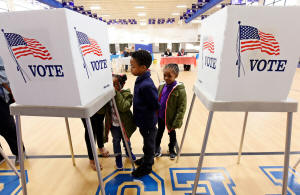U.S. steps up pursuit of far-right activists in 2016 voter suppression
probe
 Send a link to a friend
Send a link to a friend
 [May 27, 2021]
By Joseph Menn [May 27, 2021]
By Joseph Menn
SAN FRANCISCO (Reuters) -The indictment of
a far-right internet activist on charges of interfering with the 2016
U.S. election reflects a strategic shift by the Department of Justice
and sets the stage for new cases against more prominent right-wing
actors, according to people familiar with the matter.
Federal prosecutors debated for years whether and how to pursue criminal
cases against Americans suspected of disseminating false voting
instructions to manipulate the election, three people with knowledge of
the discussions said.
While some officials wanted to bring a multitude of charges, others felt
it would be too difficult to bring a voter-suppression case based on
online messaging, the people said. The hurdles include free-speech
rights, the difficulty in establishing intent and the challenge of
showing that anyone failed to vote because a specific person misled
them.

But after former President Trump's Attorney General William Barr
resigned in December, a compromise emerged: One charge to start, against
a demonstrably influential person, where evidence pointed to a real
impact, the sources told Reuters.
The Justice Department declined comment.
The Department's first target is Douglass Mackey, who was identified in
2018 as the man behind the Twitter persona 'Ricky Vaughn.' Authorities
arrested him in January on a rare charge of “conspiracy against rights”
for falsely telling people they could vote by text.
As Vaughn, Mackey was one of the most prolific boosters of @TEN_GOP
Twitter handle, a purported Tennessee Republican Party Twitter account
actually controlled by the Internet Research Agency, the notorious
Russian government contractor later indicted by Special counsel Robert
Mueller.
Mackey's own Twitter activities were so effective that one study ranked
him as more influential than NBC and CBS. Phone records cited in the new
court filings show that at least 4,900 people had texted the number he
advertised.
Mackey's attorney, Tor Ekeland, said neither he nor his client would
comment on the case.
People familiar with the new Justice Department strategy said that the
prosecutors aim to press on toward even higher-profile offenders,
potentially including some of Mackey's four alleged co-conspirators, who
have not been indicted and are identified only by their Twitter user
numbers.
Zach Thornley, a lawyer for one of the alleged co-conspirators, Tim
Gionet, told Reuters that Gionet was innocent, adding that the details
about the four in the FBI complaint reinforced his belief that FBI was
hoping to turn members of that group against each other.
Gionet, a banned YouTube prankster and former BuzzFeed social media
strategist calling himself Baked Alaska, is well-known. A week before
the vote-by-text complaint , Gionet was arrested for participating in
the Jan. 6 riot inside the U.S. Capitol, where the FBI says video showed
him refusing police orders.
Thornley said his client's actions on Twitter were protected free
speech. And with new laws around voting rights a major political issue,
he said it was suspicious that the criminal case went forward only after
the Biden Administration took over.
THE MICROCHIP FILES
The FBI has been trying to learn if the apparent attempt at suppressing
votes came from within that Twitter group, or whether it may have been
seeded by Russian actors or others, the people familiar with the probe
said.
[to top of second column]
|

Children watch their mother vote during the U.S. general election in
Greenville, North Carolina, U.S. on November 8, 2016.
REUTERS/Jonathan Drake

Another alleged co-conspirator, known as MicroChip,
could be the key to finding an answer.
MicroChip's real name has not come to light, and Reuters attempts to
reach him were unsuccessful.
Though not well known to the broader public, MicroChip was extremely
influential behind the scenes and closely followed by many fervent
Trump fans.
“He was one of the ‘generals,’ in a sense, of the online digital
armies of that time,” said Renee DiResta, a Stanford University
expert who previously researched online influence for the Senate
intelligence committee.
MicroChip' many accounts spewed racist comments and pushed a rapidly
changing slate of divisive stories on topics that Russian government
contractors also embraced. “There was definitely some overlap with
his trends and IRA trends,” DiResta said, referring to the Internet
Research Agency.
After revelations about Russian efforts to influence the election,
Twitter suspended thousands of IRA accounts and archived them
for researchers.
The archives show that the Russian accounts mentioned and tweeted
MicroChip accounts extensively. Around the 2016 election, when
Russian troll activity was peaking, they cited MicroChip as many as
35 times in a day, according to a tally by researcher Chris Scott.

Beyond that support, the IRA accounts propelled all the hashtags
MicroChip told the press he had driven, including #PizzaGate, #SpiritCooking,
and #CruzSexScandal.
MicroChip made those claims, and told a BuzzFeed reporter that
he was a patriot from Utah, at the same time that Congress was
hearing testimony about the extent of Russia’s election efforts.
MicroChip also worked with more mainstream right-wing influencers,
including Jack Posobiec of the Trump-supporting cable channel One
America News Network. In September of 2018, he spoke to Posobiec on
air in a digitally altered voice.
In that interview, Posobiec vouched for MicroChip's claim that he
had invented QAnon, again directing attention away from Russia. But
a dated chat log MicroChip used to back up his story on air was soon
called out by researchers as a fake, because it included an article
that had not been published before the log's purported date.
One America News Network did not respond to a request for comment.
(Reporting by Joseph Menn; editing by Jonathan Weber and Edward
Tobin)
[© 2021 Thomson Reuters. All rights
reserved.] Copyright 2021 Reuters. All rights reserved. This material may not be published,
broadcast, rewritten or redistributed.
Thompson Reuters is solely responsible for this content. |